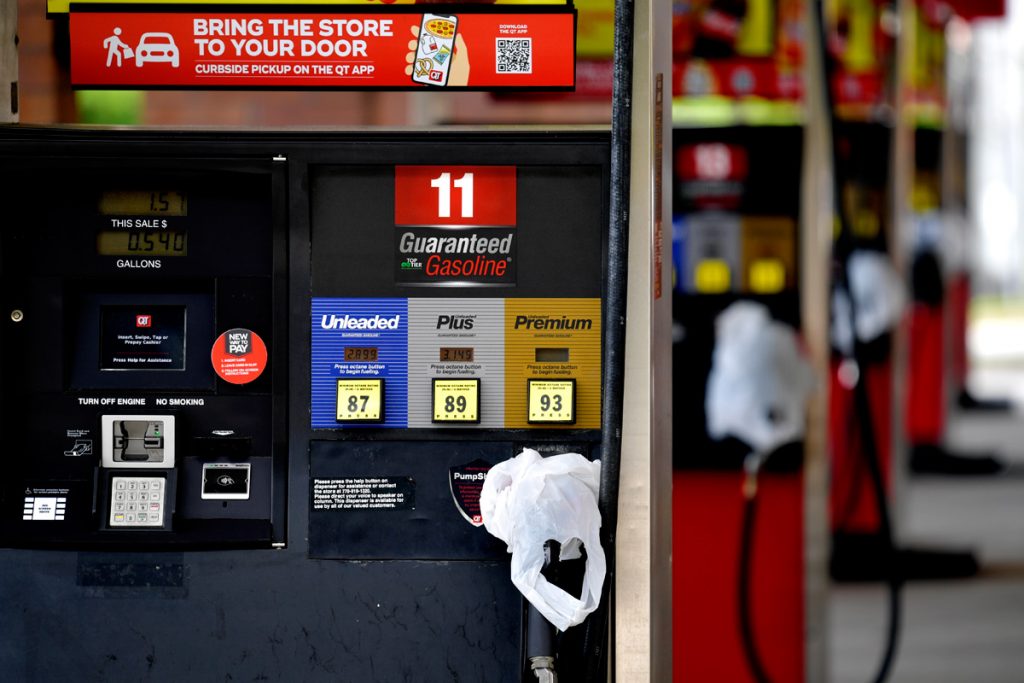Mississippi is not facing a severe shortage of gasoline this week, and state leadership have unanimously called for calm and an end to panic buying after a cyberattack on the Colonial Pipeline that straddles the southeastern portion of the U.S.
Today across Mississippi, images of long lines at gas stations and empty pumps are common on social media. But it is the panicked surge in demand, not any depletion in supply, which is driving the temporary outages, similar to the run on sanitary goods at the beginning of the COVID-19 pandemic.
WJTV’s Alex Love reported this video of long lines at the Costco gas station in Ridgeland, with customers waiting for a tanker to refill the pumps, briefly depleted due to the panic. Mississippians who do not imminently need gas should wait for the surge to reside before crowding the pumps—with the run on gas expected to recede as the panic settles this week, state leaders say.
Agriculture Commissioner Andy Gipson addressed the public at a press event today, explaining why the Colonial Pipeline cyberattack does not threaten Mississippi’s consumer gas supply.
“The Colonial Pipeline supplies less than 30 percent of the fuel in Mississippi. Our river terminals at Vicksburg, Greenville and Aberdeen are continuing to receive an abundant supply of product—increased, even, because of the delay in shipping on the pipeline. Our land terminals are continuing to fill orders. The Plantation Pipeline is increasing supply, and the Pascagoula Chevron Refinery is operating without disruption,” Gipson said.
Reeves: No Different Than Toilet Paper ‘Crisis’
Gov. Tate Reeves echoed Gipson’s comments later in the day in a social-media statement. “The Colonial Pipeline is currently estimating that they will be back functional by the end of this week. If that timeline is accurate, this media-driven crisis will be no different than the toilet paper ‘crisis’ that was manufactured at the beginning of COVID,” he said.
Although the Colonial Pipeline outage will not severely harm the state’s fuel supplies, Gipson and other statewide leadership have asked Mississippians to limit travel, if possible, for the time being, in part due to panic-driven shortages at local pumps throughout the state.
“You should call ahead to the chamber of commerce or local tourism office at your destination to inquire about local fuel supplies,” Gipson noted today.
The surge in demand accompanied a region-wide spike in gas prices, with Reuters reporting that gas prices have shot up to their highest peaks in six years, in some places over $3 a gallon.
Gipson explained that transportation costs, not supply issues, would be to blame for local price hikes. “Local price increases felt by consumers … are related to additional shipping costs incurred with picking up product in markets outside of the routine contract area due to the disruption,” he said.
Ransomware Attack
The Colonial Pipeline cyberattack occurred last Friday, as hackers struck the private company’s entire computer system with a ransomware attack. Ransomware effectively hijacks a targeted system and encrypts it, preventing any access to the infected files or systems. The hackers can then sell the cryptographic key needed to decrypt the affected computers, often in exchange for untraceable cryptocurrency like Bitcoin.
The FBI has identified DarkSide, an Eastern European hacking group, as the organization behind the attack. The New York Times reported that a signature of DarkSide’s ransomware attack is code that intentionally avoids triggering on systems running on default Russian, Ukranian, Georgian or Belarusian language settings.
The hacker group itself released a statement suggesting that the disruption of consumer access to fuel was not its intent, as well as a murky promise to avoid such attacks on vital infrastructure in the future.
“Our goal is to make money and not creating problems for society. From today, we introduce moderation and check each company that our partners want to encrypt to avoid social consequences in the future,” the group wrote.
The Biden administration has stated that it has no evidence to suggest a state actor was behind the attack. President Joe Biden has expressed his concerns over the attack, but his administration will not prevent Colonial Pipeline from paying the ransom necessary to decrypt its systems.
In a press event, Anne Neuberger, a deputy national security adviser, downplayed the administration’s role in Colonial Pipeline’s decision to pay the ransom or risk the loss of valuable data and systems. “Colonial is a private company, and we’ll defer information regarding their decision on paying a ransom to them,” Neuberger said.
Although the attack targeted a private company, other national political figures have stressed the severity of such an attack. Rob Portman, D-Ohio, called the ransomware attack on Colonial Pipeline “potentially the most substantial and damaging attack on U.S. critical infrastructure ever.”










